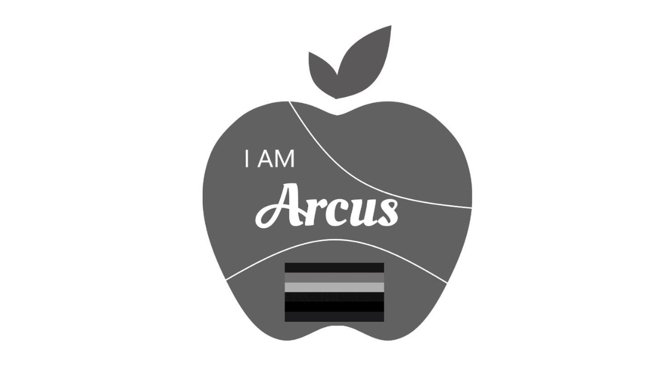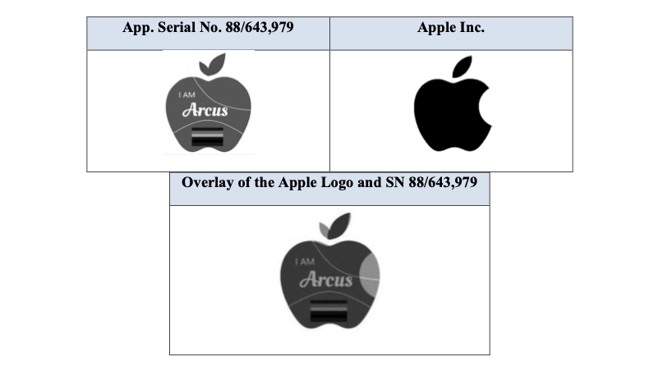Apple says water bottle logo 'nearly identical' to its own, objects to trademark
Apple is again opposing the trademarking of another company's logo on the grounds that it can readily be confused with its own.

Georgette LLC's apple logo
Following its opposition to a Norwegian political party's logo, and its successful trademark dispute with Prepare, Apple is again objecting to a logo design. It has filed a notice of opposition before the Trademark Trial and Appeal Board over Georgette LLC's apple-shaped mark for its bottled water business.
Georgette LLC's logo consists of a whole apple, not one with a bite taken out, and with the words "I am Arcus" written across it. Apple says that this mark "features a stylized apple design with a right-angled, detached leaf, rendering it visually similar to Apple's famous Apple Marks."
Apple's filing includes a side-by-side comparison of the two logos, plus an image overlaying the two. "Indeed, the overall shape of [Georgette LLC's] apple design is nearly identical to the shape of the Apple Logo," says the filing.

Detail from Apple's opposition filing showing the two logos side by side, plus overlaid to the same size
"In light of the fame of the Apple Marks," it continues, "consumers encountering Applicant's Mark are likely to believe Applicant's Goods offered under Applicant's Mark are associated with, or approved, endorsed, or provided by Apple."
Apple further objects to the use of this logo because it's intended to be used on water bottles, amongst other products. "Since long before Applicant's filing date, Apple has offered identical and/or highly related goods and services under its Apple Marks," says the filing.
Stay on top of all Apple news right from your HomePod. Say, "Hey, Siri, play AppleInsider," and you'll get latest AppleInsider Podcast. Or ask your HomePod mini for "AppleInsider Daily" instead and you'll hear a fast update direct from our news team. And, if you're interested in Apple-centric home automation, say "Hey, Siri, play HomeKit Insider," and you'll be listening to our newest specialized podcast in moments.

Georgette LLC's apple logo
Following its opposition to a Norwegian political party's logo, and its successful trademark dispute with Prepare, Apple is again objecting to a logo design. It has filed a notice of opposition before the Trademark Trial and Appeal Board over Georgette LLC's apple-shaped mark for its bottled water business.
Georgette LLC's logo consists of a whole apple, not one with a bite taken out, and with the words "I am Arcus" written across it. Apple says that this mark "features a stylized apple design with a right-angled, detached leaf, rendering it visually similar to Apple's famous Apple Marks."
Apple's filing includes a side-by-side comparison of the two logos, plus an image overlaying the two. "Indeed, the overall shape of [Georgette LLC's] apple design is nearly identical to the shape of the Apple Logo," says the filing.

Detail from Apple's opposition filing showing the two logos side by side, plus overlaid to the same size
"In light of the fame of the Apple Marks," it continues, "consumers encountering Applicant's Mark are likely to believe Applicant's Goods offered under Applicant's Mark are associated with, or approved, endorsed, or provided by Apple."
Apple further objects to the use of this logo because it's intended to be used on water bottles, amongst other products. "Since long before Applicant's filing date, Apple has offered identical and/or highly related goods and services under its Apple Marks," says the filing.
Stay on top of all Apple news right from your HomePod. Say, "Hey, Siri, play AppleInsider," and you'll get latest AppleInsider Podcast. Or ask your HomePod mini for "AppleInsider Daily" instead and you'll hear a fast update direct from our news team. And, if you're interested in Apple-centric home automation, say "Hey, Siri, play HomeKit Insider," and you'll be listening to our newest specialized podcast in moments.

Comments
This same mechanism also protected Apple from being sued by the Beatles who owned several "Apple" trademarks themselves. This case was settled in 2007; I presume Apple paid the Beatles to use the same trademarks. They might have even transferred ownership of the marks.
According to the USPTO, “likelihood of confusion exists between trademarks when the marks are so similar and the goods and/or services for which they are used are so related that consumers would mistakenly believe they come from the same source. Each application is decided on its own facts, and no strict mechanical test exists for determining likelihood of confusion.”
Here are some examples of trademark words that are used by multiple companies that don't sell the same products: Virgin, Delta, United. You may instantly recognize multiple companies that share these identical names/trademarks.
As long as two companies do not share the same goods and services, they can both register the same trademark. At this time the 45 recognized groups of services are: Chemicals; Paints; Cleaning Substances; Industrial Oils; Pharmaceuticals; Common Metals; Machines; Hand Tools; Computers and Scientific Devices; Medical Supplies; Appliances; Vehicles; Firearms; Precious Metals; Musical Instruments; Paper Goods; Rubber Products; Leather Goods; Building Materials; Furniture; Household Utensils; Ropes and Textile Products; Yarns and Threads; Textiles; Clothing; Lace and Embroidery; Carpets; Games and Sporting Goods; Meat, Fish, Poultry; Coffee, Flour, Rice; Grains, Agriculture; Beers and Beverages; Alcoholic Beverages; Tobacco Products; Advertising and Business Services; Insurance and Finance Services; Construction and Repair Services; Telecommunications Services; Shipping and Travel Services; Material Treatment Services; Education and Entertainment Services; Science and Technology Services; Food Services; Medical and Vet Services; Legal and Security Services.
In the case of Prepare, Prepare sold groceries, but they did it through an app, which made Apple's case stronger against them. In this case I don't see overlap.
not a lawyer but aren't we all????
The Graphic Designer though clearly took the lazy way out. They copied Apple’s design and modified it hoping nobody would notice until the cheque cleared.
Unless this was a case where the head of the company thought he could do better and just did it them self.
In either case Apple will win this one hands down.